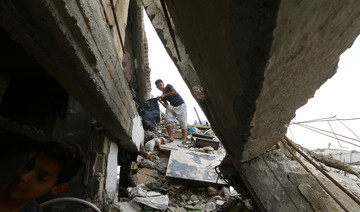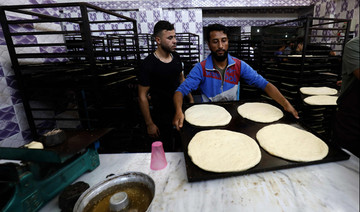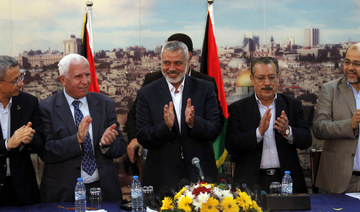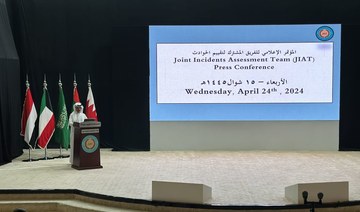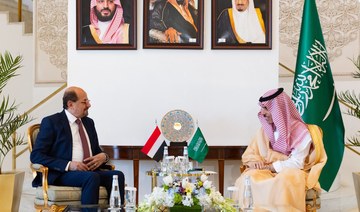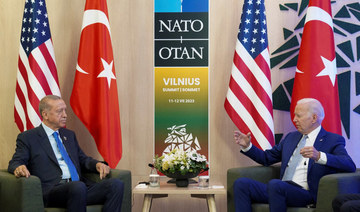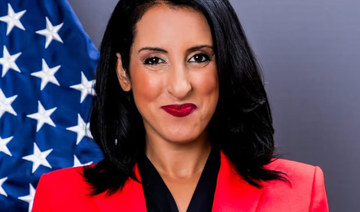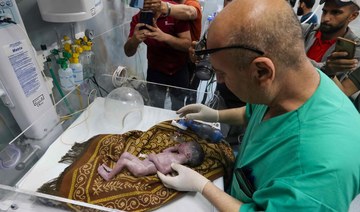Raqqa, Syria: All day, dinghies cross the Euphrates River to shuttle residents into the pulverised cityscape of Syria’s Raqqa, where bridges, homes, and schools remain gutted by the offensive against Daesh.
Exactly a year has passed since a blistering US-backed assault ousted the extremists from their one-time Syrian stronghold, but Raqqa — along with the roads and bridges leading to it — remains in ruins.
To enter the city, 33-year-old Abu Yazan and his family have to pile into a small boat on the southern banks of the Euphrates, which flows along the bottom edges of Raqqa.
They load their motorcycle onto the small vessel, which bobs precariously north for a few minutes before dropping off passengers and their vehicles at the city’s outskirts.
“It’s hard — the kids are always afraid of the constant possibility of drowning,” says bearded Abu Yazan.
“We want the bridge to be repaired because it’s safer than water transport.”
The remains of Raqqa’s well-known “Old Bridge” stand nearby: a pair of massive pillars, the top of the structure shorn off.
It was smashed in an air strike by the US-led coalition, which bombed every one of Raqqa’s bridges to cut off the extemists’ escape routes.
The fighting ended on October 17 last year, when the city finally fell to the Syrian Democratic Forces, which then handed it over to the Raqqa Civil Council (RCC) to govern.
But 60 bridges are still destroyed in and around the city, says RCC member Ahmad Al-Khodr.
“The coalition has offered us eight metal bridges,” he says, to link vital areas in Raqqa’s countryside.
Rights group Amnesty International estimates around 80 percent of Raqqa was devastated by fighting, including vital infrastructure like schools and hospitals.
The national hospital, the city’s largest medical facility, was where Daesh made its final stand. It still lies ravaged.
Private homes were not spared either: 30,000 houses were fully destroyed and another 25,000 heavily damaged, says Amnesty.
Ismail Al-Muidi lost his son, an SDF fighter, and his home.
“I buried him myself with these two hands,” says Muidi, 48.
“I was not as affected when I lost the house, but I had hoped it would shelter me and my family,” he adds.
Now homeless, he lives with his sister in the central Al-Nahda neighborhood.
“The coalition destroyed the whole building, and all our belongings went with them,” he says.
Anxiety over eking out a living has put streaks of grey into Muidi’s hair and beard.
“How could I rebuild this house? We need help to remove the rubble, but no one has helped us at all,” he says.
Since Daesh was ousted, more than 150,000 people have returned to Raqqa, according to United Nations estimates last month.
But the city remains haunted by one of Daesh’s most infamous legacies: a sea of mines and unexploded ordnance that still maims and kills residents to this day.
The RCC says it does not have enough money to clear out the rubble still clogging up Raqqa’s streets, much less rehabilitate its water and electricity networks.
Khodr unfurls a map of the city in front of him at his office in the RCC, pointing out the most ravaged neighborhoods.
“The districts in the center of the city were more damaged — 90 percent destroyed — compared to a range of 40 to 60 percent destroyed in the surrounding areas,” he tells AFP.
“The destruction is massive and the support isn’t cutting it.”
A plastic bucket in hand, Abd Al-Ibrahim sits despondently on a curbside in the Al-Ferdaws neighborhood.
Fighting destroyed his home, so he now squats in another house but there has been no water there for three days.
“I come sit here, hoping somebody will drive by to give me water. But no one comes,” the 70-year-old says, tearing up.
He points to a mound of rubble nearby.
“My house is like this now. We were in paradise. Look at what happened to us — we’re literally begging for water.”
The coalition has helped de-mine, remove rubble, and rehabilitate schools in Raqqa, but efforts have been modest and piecemeal compared to the scale of the destruction.
“You can’t call this reconstruction — it’s all empty talk,” says Samer Farwati, who peddles cigarettes across from his destroyed house in the Masaken Al-Tobb district.
He pays $120 to rent a home since his was hit in an air strike.
Farwati says he no longer trusts officials after too many empty promises.
“If they helped us even a little bit, we could complete the construction. But there’s no hope at all,” he says.
Retaken but not rebuilt: Syria’s Raqqa a year after Daesh ouster
Retaken but not rebuilt: Syria’s Raqqa a year after Daesh ouster
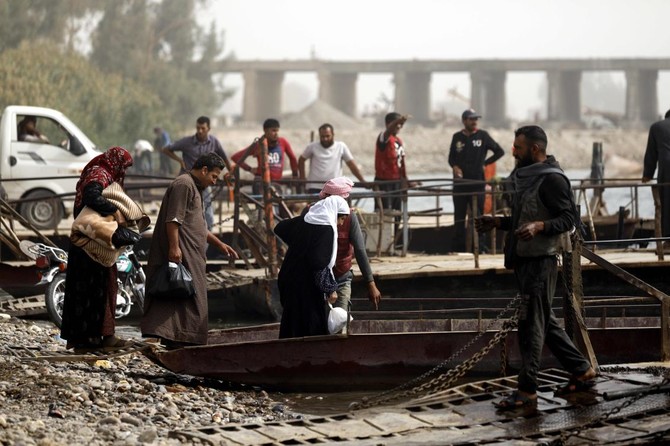
- Exactly a year has passed since a blistering US-backed assault ousted the extremists from their one-time Syrian stronghold
- Since Daesh was ousted, more than 150,000 people have returned to Raqqa
Hamas says it received Israel’s response to its ceasefire proposal
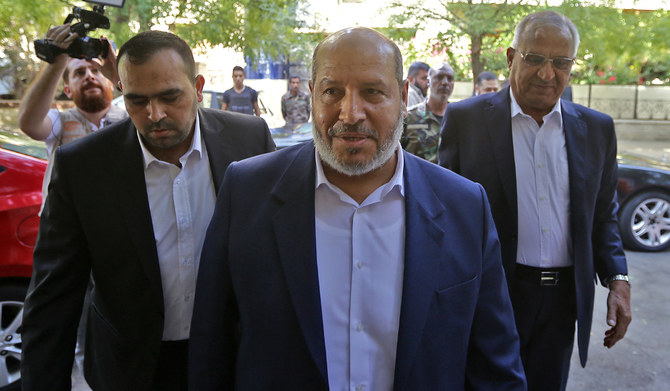
- White House national security adviser Jake Sullivan said on Friday he saw fresh momentum in talks to end the war and return the remaining hostages
- Israel has killed more than 34,000 Palestinians in Gaza, mostly women and children, according to the health ministry in the Hamas-run territory
CAIRO: Hamas said it had received on Saturday Israel’s official response to its latest ceasefire proposal and will study it before submitting its reply, the group’s deputy Gaza chief said in a statement.
“Hamas has received today the official response of the Zionist occupation to the proposal presented to the Egyptian and the Qatari mediators on April 13,” Khalil Al-Hayya, who is currently based in Qatar, said in a statement published by the group.
After more than six months of war with Israel in Gaza, the negotiations remain deadlocked, with Hamas sticking to its demands that any agreement must end the war.
An Egyptian delegation visited Israel for discussion with Israeli officials on Friday, looking for a way to restart talks to end the conflict and return remaining hostages taken when Hamas fighters stormed into Israeli towns on Oct. 7, an official briefed on the meetings said.
The official, who spoke on condition of anonymity, said Israel had no new proposals to make, although it was willing to consider a limited truce in which 33 hostages would be released by Hamas, instead of the 40 previously under discussion.
On Thursday, the United States and 17 other countries appealed to Hamas to release all of its hostages as a pathway to end the crisis.
Hamas has vowed not to relent to international pressure but in a statement it issued on Friday it said it was “open to any ideas or proposals that take into account the needs and rights of our people.”
However, it stuck to its key demands that Israel has rejected, and criticized the joint statement issued by the USand others for not calling for a permanent ceasefire and the withdrawal of Israeli forces from Gaza.
White House national security adviser Jake Sullivan said on Friday he saw fresh momentum in talks to end the war and return the remaining hostages.
Citing two Israeli officials, Axios reported that Israel told the Egyptian mediators on Friday that it was ready to give hostage negotiations “one last chance” to reach a deal with Hamas before moving forward with an invasion of Rafah, the last refuge for around a million Palestinians who fled Israeli forces further north in Gaza earlier in the war.
Meanwhile, in Rafah, Palestinian health officials said an Israeli air strike on a house killed at least five people and wounded others.
Hamas fighters stormed into Israeli towns on Oct. 7, killing 1,200 people and capturing 253 hostages. Israel has sworn to annihilate Hamas in an onslaught that has killed more than 34,000 Palestinians.
Yemen’s Houthis say their missile hit Andromeda Star oil ship in Red Sea
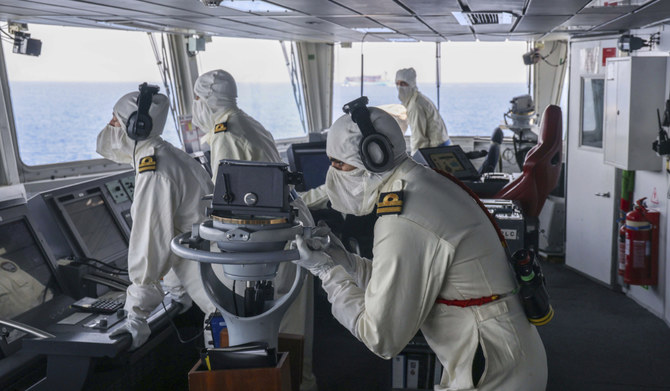
- Israel has killed more than 34,000 Palestinians, according to Gaza’s Health Ministry
- The Houthis on Friday said they downed an American MQ-9 drone in airspace of Yemen’s Saada province
CAIRO/LOS ANGELES: Yemen’s Houthis said on Saturday their missiles hit the Andromeda Star oil tanker in the Red Sea, as they continue attacking commercial ships in the area in a show of support for Palestinians fighting Israel in the Gaza war.
US Central Command confirmed that Iran-backed Houthis launched three anti-ship ballistic missiles into the Red Sea from Yemen causing minor damage to the Andromeda Star.
The ship’s master reported damage to the vessel, British maritime security firm Ambrey said.
A missile landed in the vicinity of a second vessel, the MV Maisha, but it was not damaged, US Central Command said on social media site X.
Houthi spokesman Yahya Sarea said the Panama-flagged Andromeda Star was British owned, but shipping data shows it was recently sold, according to LSEG data and Ambrey.
Its current owner is Seychelles-registered. The tanker is engaged in Russia-linked trade. It was en route from Primorsk, Russia, to Vadinar, India, Ambrey said.
Iran-aligned Houthi militants have launched repeated drone and missile strikes in the Red Sea, Bab Al-Mandab Strait and Gulf of Aden since November, forcing shippers to re-route cargo to longer and more expensive journeys around southern Africa and stoking fears the Israel-Hamas war could spread and destabilize the Middle East.
The attack on the Andromeda Star comes after a brief pause in the Houthis’ campaign that targets ships with ties to Israel, the United States and Britain.
The USS Dwight D. Eisenhower aircraft carrier sailed out of the Red Sea via the Suez Canal on Friday after assisting a US-led coalition to protect commercial shipping.
The Houthis on Friday said they downed an American MQ-9 drone in airspace of Yemen’s Saada province.
Syrian woman is jailed for life over Istanbul killer blast; over 20 others also get prison sentences
Syrian woman is jailed for life over Istanbul killer blast; over 20 others also get prison sentences
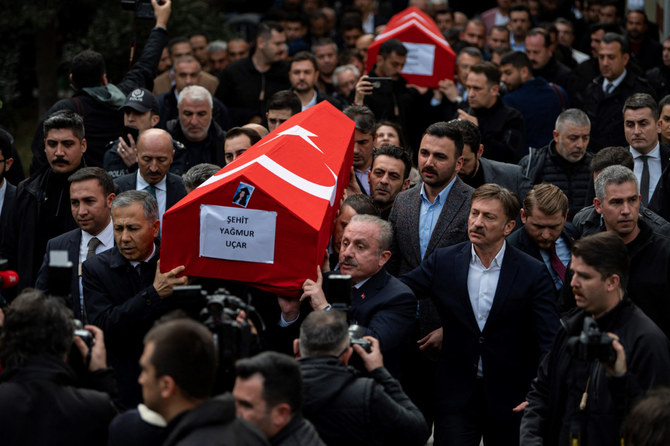
- Ahlam Albashir was given a total of seven life sentences by a Turkish court for carrying out the attack in Istiklal Avenue on Nov. 13, 2022
- Twenty others were given prison sentences ranging from four years to life
JEDDAH: A Syrian woman who planted a bomb that killed six people in Istanbul’s main shopping street 18 months ago was jailed for life on Friday.
Ahlam Albashir was given a total of seven life sentences by a Turkish court for carrying out the attack in Istiklal Avenue on Nov. 13, 2022. Six Turkish citizens, two members each from three families, died in the blast in the busy street packed with shoppers and tourists. About 100 people were injured.
More than 30 other people were accused in connection with the explosion. Four were released from prison on Friday, and a further 10 were ordered to be tried separately in their absence because they could not be found.
Twenty others were given prison sentences ranging from four years to life. Of those, six received aggravated life imprisonment for murder and “disrupting the unity and integrity of the state.”
Turkiye blamed Kurdish militants for the explosion, and said the order for the attack was given in Kobani in northern Syria, where Turkish forces have conducted operations against the Syrian Kurdish YPG militia in recent years.
The YPG and the outlawed PKK Kurdish separatist group, which has fought a decades-old insurgency against the Turkish state, denied involvement in the attack. No group admitted it.
Istanbul has been attacked in the past by Kurdish, Islamist and leftist militants. A wave of bombings and other attacks began nationwide when a ceasefire between Ankara and the PKK broke down in mid-2015.
More than 40,000 people have been killed in the PKK’s conflict with Turkiye since the militant group took up arms in 1984. It is considered a terrorist organisation by Turkiye, the EU and the US.
1 case dismissed, 4 on hold in UN investigation into Oct. 7 allegations against UNRWA staff
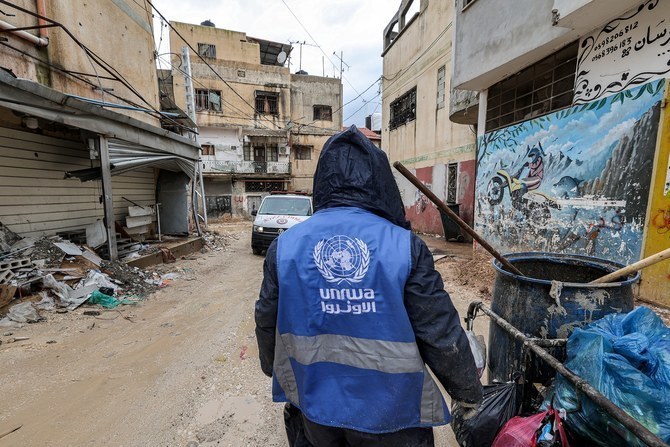
- Investigators have been looking into cases of 12 agency workers accused by Israel in January of participating in attacks by Hamas, and 7 others named later
- 14 cases remain under investigation but the others were dismissed or suspended due to lack of evidence; UN’s internal investigators due to visit Israel again in May
NEW YORK CITY: UN spokesperson Stephane Dujarric said on Friday that the organization’s internal oversight body has been investigating 19 employees of the UN Relief and Works Agency for Palestine Refugees over allegations that they were affiliated with Hamas and other militant groups.
Israeli authorities alleged in January that 12 UNRWA workers participated in the Oct. 7 attacks by Hamas against Israel.
The agency immediately cut ties with the named individuals, and UN Secretary-General Antonio Guterres, in consultation with UNRWA Commissioner General Philippe Lazzarini, ordered an independent review to evaluate the measures taken by the agency to ensure adherence to the principle of neutrality and how it responds to allegations of breaches of neutrality, particularly in the challenging context of the situation in Gaza.
In a wide-ranging report published this week, the investigators, led by Catherine Colonna, a former foreign minister of France, said Israeli authorities have yet to provide any evidence to support the allegations against UNRWA workers. They also noted that Israel had not previously raised concerns about any individuals named on the agency staffing lists it has been receiving since 2011.
They stated in the report: “In the absence of a political solution between Israel and the Palestinians, UNRWA remains pivotal in providing life-saving humanitarian aid and essential social services, particularly in health and education, to Palestinian refugees in Gaza, Jordan, Lebanon, Syria and the West Bank.
“As such, UNRWA is irreplaceable and indispensable to Palestinians’ human and economic development. In addition, many view UNRWA as a humanitarian lifeline.”
Guterres also ordered a separate investigation by the UN’s own Office of Internal Oversight Services to determine the accuracy of the Israeli allegations. The mandate of the OIOS, an independent office within the UN Secretariat, is to assist the secretary-general in the handling of UN resources and staff through the provision of internal audit, investigation, inspection and evaluation services.
Dujarric said the 19 members of UNRWA staff under investigation included the 12 named by the Israeli allegations in January, whose contracts were immediately terminated, and seven others the UN subsequently received information about, five in March and two in April.
Of the 12 employees identified by Israeli authorities in January, eight remain under OIOS investigation, Dujarric said. One case was dismissed for lack of evidence and corrective administrative action is being explored, he added, and three cases were suspended because “the information provided by Israel is not sufficient for OIOS to proceed with an investigation. UNRWA is considering what administrative action to take while they are under investigation.”
Regarding the seven additional cases brought to the attention of the UN, one has been suspended “pending receipt of additional supporting evidence,” Dujarric said.
“The remaining six of those cases are currently under investigation by OIOS. OIOS has informed us that its investigators had traveled to Israel for discussions with the Israeli authorities and will undertake another visit during May.
“These discussions are continuing and have so far been productive and have enabled progress on the investigations.”
The initial allegations against some members of its staff threw the agency, which provides aid and other services to Palestinian refugees in Gaza and across the region, into crisis. The US, the biggest single funder of UNRWA, and several other major donors put their contributions to the organization on hold.
In all, 16 UN member states suspended or paused donations, while others imposed conditions on further contributions, putting the future of the agency in doubt. Many of the countries, including Germany, later said their funding would resume. However, US donations remain on hold.
37 million tonnes of debris in Gaza could take years to clear: UN
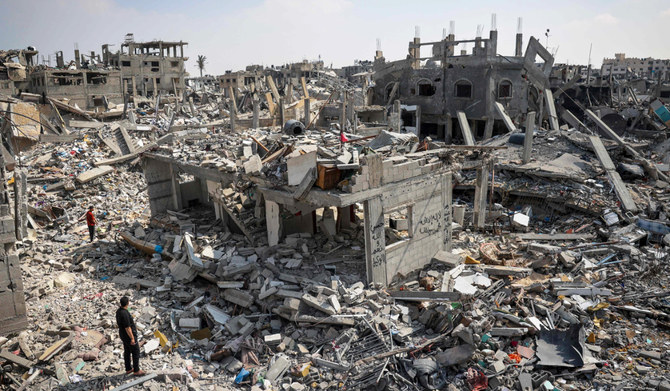
- “We do know that we estimated 37 million tonnes of debris, which is approximately 300 kg per square meter,” Lodhammar added
- Israel has killed more than 34,000 Palestinians in Gaza, mostly women and children, according to the health ministry in the Hamas-run territory
GENEVA: There are some 37 million tonnes of debris to clear away in Gaza once the Israeli offensive is over, a senior official with the UN Mine Action Service said on Friday.
And unexploded ordnance buried in the rubble would complicate that work, said UNMAS’ Pehr Lodhammar, who has run mine programs in countries such as Iraq.
It was impossible to say how much of the ammunition fired in Gaza remained live, said Lodhammar.
“We know that typically there is a failure rate of at least 10 percent of land service ammunition,” he told journalists in Geneva.

“We do know that we estimated 37 million tonnes of debris, which is approximately 300 kg per square meter,” he added.
He said that starting from a hypothetical number of 100 trucks would take 14 years to clear away.
Lodhammar was speaking as UNMAS launched its 2023 annual report on Friday.
The war in Gaza between Israel and Hamas erupted when Hamas launched an unprecedented attack on Israel on Oct. 7.
Also on Friday, the head of an aid group warned that an Israeli assault on southern Gaza’s Rafah area would spell disaster for civilians, not only in Gaza but across the Middle East,
Jan Egeland said the region faced a “countdown to an even bigger conflict.”
Egeland, the secretary-general of the Norwegian Refugee Council, also said that 1.3 million civilians seeking refuge in Rafah — including his aid group’s staff — were living in “indescribable fear” of an Israeli offensive.
Egeland urged Israeli Prime Minister Benjamin Netanyahu not to proceed with the operation.
“Netanyahu, stop this. It is a disaster not only for the Palestinians, it would be a disaster for Israel. You will have a stain on the Israeli conscience and history forever,” he said.
The NRC head spoke to Reuters in Lebanon, where he visited southern villages that he said were caught in a “horrific crossfire” between the Israeli military and Hezbollah.
“I am just scared that we haven’t learned from 2006,” said Egeland, referring to the month-long war between Hezbollah and Israel that was the two foes’ last bloody confrontation, during which he headed the UN’s relief operations.
“We do not need another war in the Middle East. At the moment, I’m feeling like (this is a) countdown to an even bigger conflict,” he said.



